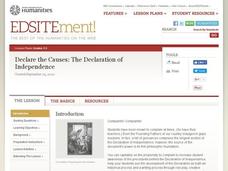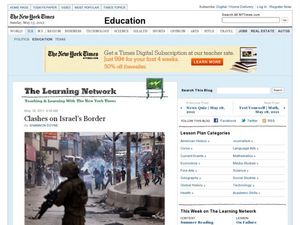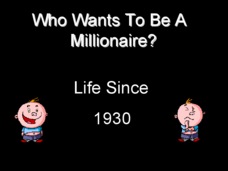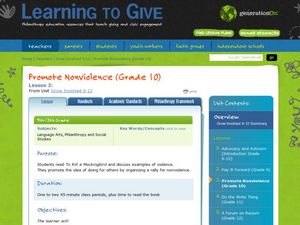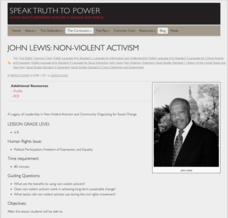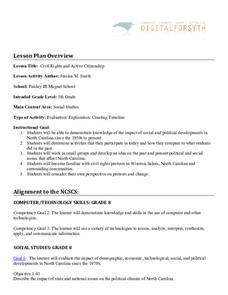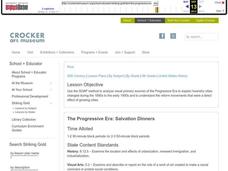Annenberg Foundation
Exploring Borderlands
What motivated Europeans to explore the New World, and what effects did their exploration have on Native American populations? The second installment of a 16-part American Passages series prompts pupils to watch a video and read several...
US Institute of Peace
Simulation on Northern Ireland: One Step at a Time - The Derry March and Prospects for Peace
Where does tradition fit in a divided community with violence on both sides? Scholars learn about the marches in Northern Ireland and the many issues surrounding them. They take on roles in the community and try to convince others of...
Edline
How Did the Unification of Germany Change the Course of World History?
Here you'll find a nice guided notes instructional activity on Otto von Bismarck, which details Bismarck's plan to unify Germany, as well as asks learners to analyze his motivations and overall impact.
DC Vote
One Kid, One Vote
Learn about why the citizens of Washington, D.C. feel unrepresented in Congress with an article about D.C voting rights. Individuals read about the movement toward congressional representation in Washington, D.C., before...
Curated OER
Declare the Causes: The Declaration of Independence
Students study the Declaration of Independence and the process our founding fathers went through to get it written and signed. They analyze other similar historical documents and draft and present their own declarations.
Curated OER
Irony
Using examples from Socrates to Johnny Carson, this slideshow presents your students with the history and definition of dramatic irony, satire, situational irony, and tragic irony. This presentation would be useful in a language arts...
Curated OER
Clashes on Israel's Border
Here are 11 questions intended to guide learners as they read a New York Times article about the violence and conflict between Israel and Palestine. They can review the questions and then read the article to help answer them. A link to a...
Education World
Every Day Edit - Gandhi
For this everyday editing activity, students correct grammatical mistakes in a short paragraph about Gandhi. The errors range from punctuation, capitalization, grammar, and spelling.
Curated OER
Cartoons for the Classroom: The Tea Party
Investigate the Tea Party Movement through this political cartoon analysis handout! Background information gives scholars the necessary context to access the cartoon, and includes the historical derivation of the Tea Party name. Three...
Curated OER
Who Wants to be a Millionaire: Life Since 1930
The King of Rock'n Roll, Twiggy, William Beveridge? Sounds like its time to review events occurring after 1930. Kids play this fun Millionaire-style game to review common knowledge British trivia. This game would be a fun challenge for...
Curated OER
Promote Nonviolence
Take a look at the topic of violence as seen in Harper Lee's To Kill a Mockingbird. Discuss together the values that Atticus holds and brainstorm ways to combat violence in a similar manner to what he portrays in the novel. Get your...
Speak Truth to Power
John Lewis: Non-Violent Activism
After comparing and contrasting non-violent and violent social movements, your young historians will take a closer look at the work and influence of John Lewis on the civil rights movement. They will then choose a current social...
Constitutional Rights Foundation
Puritan Massachusetts: Theocracy or Democracy?
Was Puritan society governed as more of a theocracy or democracy? After comparing and contrasting a series of primary source documents, middle and high schoolers form small groups and debate the question.
Digital Forsyth
Civil Rights and Active Citizenship
As part of a study of the American Civil Rights movement, class members search the Internet to find important facts, people, events, and pictures that they use to create a timeline of events between 1955 and 1970.
Soft Schools
Civil Rights
Informational text about the Civil Rights Movement challenges young historians to prove their reading comprehension skills with six multiple choice questions. After answers are submitted a new screen displays a score,...
Curated OER
Encouraging Answers
What is the celebration of Columbus Day really about? Older learners use inquiry-based methods to find out who Columbus really was and what motivated his journeys. They take on the roles of town officials who must consider whether or not...
VH1
Lessons for Hight School Music Classes: Lesson 1
The phrase, "You sold out" has been thrown around among musicians that have lent their talents to the corporate world. Here, the class engages in an interesting discussion on how musicians make a living and the influence of commercialism...
National Endowment for the Humanities
Lesson 1: The First Great Awakening
High schoolers examine the First Great Awakening and how it affected religious belief in colonial America. They read and analyze primary source documents, explore various websites, and write a five-paragraph essay examining the beliefs...
Curated OER
The Boston Tea Party: Costume Optional?
Learners investigate the events of the Boston Tea Party. They read and analyze first-hand accounts, answer discussion questions, develop a chart of facts, and create a newspaper article, letter, or factual report.
Curated OER
The Progressive Era
Eighth graders utilize the SOAP method to analyze a work of art and relate it to what they know about the Progressive Era and the reasons why cities changed and the ways in which cities changed during the end of the 19th century. They...
Curated OER
Citizen Advocacy
Young scholars examine how citizens can influence legislation. They watch a video, develop a list of how citizens can influence legislation, answer video discussion questions, conduct Internet research, and write a recommendation for...
Curated OER
Die Weisse Rose: German History
Young scholars conduct research on a German anti-Nazi group named "Die Weisse Rose", the White Rose, that eventually lost their lives for their resistance to Nazi rule. They view films, access the Internet, prepare responsive narratives...
Curated OER
Using Primary Sources to Study the Holocaust
Engage your middle schoolers with Pastor Martin Niemoller's famous poem that begins, "First they came for the communists." Now that you have their attention, send learners to the various work stations you created to have them explore...
Curated OER
The Reformers: Martin Luther and César Chávez
Kids consider the characteristics needed to be reformers like Martin Luther King and Cesar Chavez. They read a series of quotes focused on both animal and human rights to answer eight critical thinking questions.
Other popular searches
- Protestant Reformation
- 1960's Protest Songs
- Student Protests
- Protest Songs
- Vietnam War Protests
- Nonviolent Protest
- Political Protest
- Social Protest
- Mass Protest
- The Protestant Reformation
- Nonviolence Protests
- Vietnam Protest Songs






